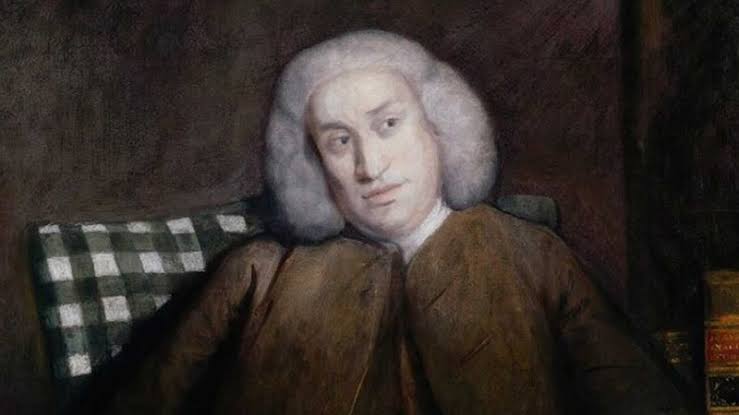Biography
Samuel Johnson (usually known as Dr Johnson) (Sept. 18, 1709, Lichfield, Staffordshire, Eng.— Dec. 13, 1784, London) was an English author, poet, moralist and literary critic. One of Dr Johnson’s greatest contributions was publishing, in 1747, The Dictionary of the English Language.
Johnson was born in Lichfield, Staffordshire to a family of pooer booksellers. He was educated at Lichfield Grammar School before going to Pembroke College, Oxford. However, due to a lack of funds, he left after a year – never completing his degree. After Oxford, he worked as a teacher in Market Bosworth and Birmingham. In 1735, he married Elizabeth Porter, a widow 20 years older than him. Together they opened a school at Edial near Lichfield, but it later closed due to a lack of money. The Johnson’s then left for London, where he began spending more time working as a writer.
He made a living writing for the Gentleman’s Magazine – a report on Parliament. He also wrote a tragedy, Irene, and some attempts at poetry.
Johnson was also employed to catalogue the extensive library of Edward Harley, Earl of Oxford. This gave Johnson the opportunity to indulge his great love of reading and the English language. He was inspired to start working on a comprehensive dictionary of the English language. It would take him eight years, but it was considered to be his finest achievement. Though other dictionaries were in existence, the ‘Johnson Dictionary of the English language’ was a huge step forward in its comprehensiveness and quality.
Johnson was a prolific writer. For two years he almost single-handedly wrote a journal – ‘The Rambler’ full of moral essays.
In 1752, his wife ‘Tetty’ died, plunging him into depression, which proved difficult for him to escape during the rest of his life.
After the publication of his dictionary in 1755, he began to be more appreciated by literary society. He was awarded an honorary degree by Oxford University, and in 1760 was given a pension of £300 a year from George III. This enabled him to engage in more social and cultural activities. He was friends with many of the leading cultural figures of the day, such as Sir Joshua Reynolds a painter, and the writer Oliver Goldsmith.
In 1764, he met the young Scot, James Boswell who would become his celebrated biographer. Together they toured the Hebrides, which Johnson wrote about in ‘A Journey to the Western Isles of Scotland’, (1775) James Boswell wrote about Johnson in great detail, including information on Johnson’s unusual mannerisms, such as odd gestures and tics (which may have been a form of Tourette’s syndrome)
Johnson also embarked on an ambitious project – “Lives of the Most Eminent English Poets” (10 vols) and an influential edition of Shakespeare’s plays.
Essays by Samuel Johnson
- A Letter to Lord Chesterfield
- A Plan of The English Dictionary
- A Preface to A Dictionary of the English Language
- Addison
- Akenside
- Blackmore
- Butler
- Collins
- Congreve
- Cowley
- Denham
- Dorset
- Duke
- Dyer
- Garth
- Gay
- Gray
- Halifax
- Hughes
- King
- Life of Cowley
- Lyttelton
- Mallet
- Milton
- Otway
- Parnell
- Philips, A
- Philips, J
- Pomfret
- Preface to Shakespeare
- Prior
- Rasselas Prince of Abyssinia
- Rochester
- Roscommon
- Rowe
- Savage
- Sheffield
- Shenstone
- Smith
- Somervile
- Sprat
- Stepney
- Swift
- Thomson
- Tickell
- Waller
- Walsh
- Watts
- West
- Young
Poems by Samuel Johnson
- A Short Song Of Congratulation
- Anacreon: Ode 9
- Autumn
- Burlesque
- Drury-Lane Prologue Spoken By Mr. Garrick
- Epitaph On Sir Thomas Hanmer, Bart.
- Evening Ode
- Friendship
- From Boethius
- From Boethius: De Consolatione Philosophiae; Book Ii. Metre 2.
- From Boethius: De Consolatione Philosophiae; Book Ii. Metre 4.
- From Boethius: De Consolatione Philosophiae; Book Iii. Metre 5
- From The Medea Of Euripides
- from The Vanity of Human Wishes
- Gnothi Seauton
- Horace: Book 1, Ode 22
- Horace: Book Ii. Ode 9
- Horace: Book Iv. Ode 7
- Inspiration
- London – In Imitation Of The Third Satire Of Juvenal
- On Hearing Miss Thrale Consulting With A Friend About A Gown And Hat
- On Lyce – An Elderly Lady
- On Seeing A Bust Of Mrs. Montague
- On the Death of Dr. Robert Levet
- On The Death Of Stephen Grey, F.R.S.
- One And Twenty
- Parody Of A Translation From The Medea Of Euripides
- Part Of The Dialogue Between Hector And Andromache
- Song
- Spring
- Stella In Mourning
- Summer
- The City Of God
- The Natural Beauty
- The Vanity Of Human Wishes
- The Vanity Of Wealth
- The Winter’s Walk
- The Young Author
- To A Young Lady, On Her Birthday
- To Lady Firebrace
- To Miss Hickman, Playing The Spinet
- To Miss—,
- To Mrs. Thrale On Her Completing Her Thirty-Fifth Year
- To Myrtilis – The New Year’s Offering
- Translation Of A Speech Of Aquileio In The Adriano Of Metastasio
- Winter
- Written At The Request Of A Gentleman To Whom A Lady Had Given A Sprig Of Myrtle

